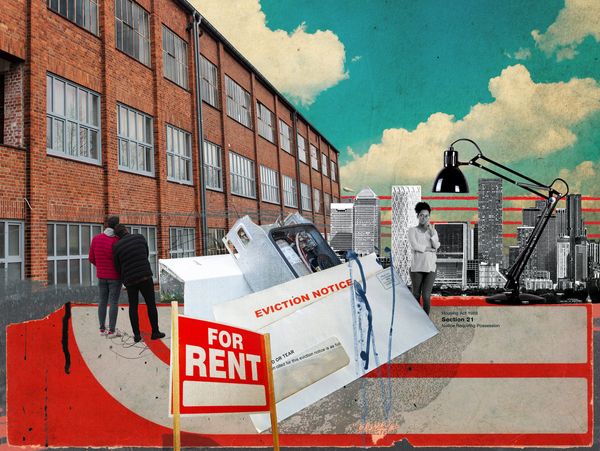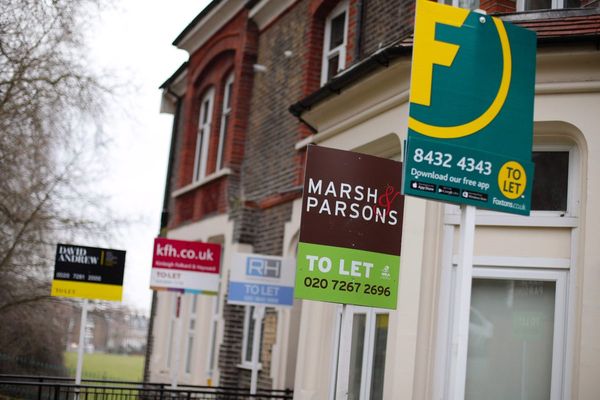
Renters and advocates are worried there could be a surge in no-grounds evictions in New South Wales over the coming month as landlords act ahead of the law changing in mid-May.
The Tenants’ Union of NSW says it’s a “real risk” and the Minns government has dropped the ball by not putting interim measures in place to protect renters.
Luke Fennell and his family in 2023 faced a massive 40% increase in the rent of their Sydney home. Fennell knew challenging the rise was risky but fought for a 25% jump instead. Two months later, the engineer was served a no-grounds eviction notice.
“You feel like a mug,” Fennell said. “The whole system is set up to ensure that, as a tenant, you have no power at all.”
Fennell, his partner and their two adult children packed their lives into boxes and relocated to a neighbouring suburb. The move cost $3,000.
“I couldn’t take a 40% increase on the chin. That was just ridiculous. But I paid the price for not doing that,” he said.
The NSW government last year changed the law to make it harder for renters to be evicted, and easier to rent with a pet. Labor also capped rent increases to once a year.
In late March, the state government announced the ban on no-grounds evictions would start on 19 May. Landlords and agents will have to give renters a reason to end their tenancy and provide evidence that those grounds are genuine – such as a change of property use, selling the home or the landlord is moving in.
Housing organisations have welcomed the 2024 legislation but are bracing for a spike in no-grounds evictions before the change takes effect. They are questioning why the government did not try to prevent 11th-hour rental terminations.
Camilla Pandolfini, the chief executive of Redfern Legal Centre, which runs the Inner Sydney Tenants’ Advice and Advocacy Service, said her team was preparing to assist an influx of tenants served no-grounds termination notices before the reforms commence.
Pandolfini said there was an increase in inquiries from tenants evicted without cause – typically after challenging a rent increase – when the reforms were announced in July 2024.
“We can reasonably expect a similar spike, which may continue until 18 May, as landlords are still able to evict tenants under the old rules until that date,” she said.
Leo Patterson Ross, the CEO of the Tenants’ Union of NSW, said his organisation was “preparing for a surge” in no-grounds evictions. “It’s a real risk that people are right to be concerned about,” he said.
When no-grounds evictions were banned in 2021 in Victoria – except at the end of the first fixed term – there was a 5-10% spike in bonds being released from the bonds board in the three months before the law change, Patterson Ross said.
“That doesn’t necessarily say that they were evictions, but there wasn’t really an explanation about why tenants would be moving voluntarily,” he said.
After the NSW reforms were announced, the union saw some landlords, particularly social housing providers, serving no-grounds evictions with six months’ notice – a move that Patterson Ross suspected was to get ahead of the changes.
Yumi Lee of the Older Women’s Network NSW said she expected to “see some unscrupulous landlords trying to get rid of people” before 19 May. She said she had spoken to women who had been evicted since the law change was announced.
“On anecdotal evidence, we know that the lead-up to [the law change] is a time of great anxiety, and for the older women who have been evicted, it has just resulted in a deterioration of their mental and financial health,” Lee said.
The tenants’ union did not see a change in the number of no-grounds evictions in the three months before rental reforms came into effect in Queensland last year – probably because those changes were less significant than in Victoria, Patterson Ross said.
The union did not have data from the ACT and South Australia which introduced comprehensive no-cause reforms in 2023 and 2024, respectively.
Patterson Ross said the union had advised the NSW government to put in place measures to prevent a surge in evictions – such as reducing the time between the date the law was passed and its commencement or extending the powers of the NSW Civil and Administrative Tribunal to police pre-emptive evictions. But the Minns government did not heed the advice.
In the ACT, which was the first Australian jurisdiction to ban all forms of tenancy termination without a legitimate cause, legislation came into effect a week after it passed parliament.
Lee said transitional protections would have “softened the blow a little bit” for older tenants who “face the absolute terror of having to find another rental within their budget”.
Anoulack Chanthivong, the NSW minister for better regulation and fair trading, said the state government understood the advocacy groups’ concerns.
“The government has considered whether additional protections are required for renters however, banning the use of no-grounds terminations for a transitional period is not practical or sensible as this would ignore other legitimate reasons for a lease to be ended – for example, where the landlord needs to move into the property and for other reasons that these reforms have recognised as valid reasons to end a tenancy,” he said.
Renters nearing the end of a fixed-term tenancy between the end of March and mid-May were most at risk and the state’s rental taskforce was charged with enforcing existing rules.
“We strongly encourage all owners to act in good faith before the new laws take effect, but at the end of the day, the risk of owners evicting tenants without any reasonable grounds is the reason why we have introduced these new laws – to ensure no-grounds evictions can no longer happen,” Chanthivong said.
For Fennell – who has since bought his own home – the new laws address what he said was the “number one problem” with tenancy laws in NSW.
“You really felt if you complained about something, or if you stood your ground, you would just get thrown out,” he said.
“So you were always cautious about asking for repairs or pushing back on rent increases, because you just knew that the penalty for inflaming the anger of the landlord was just not worth it.”










